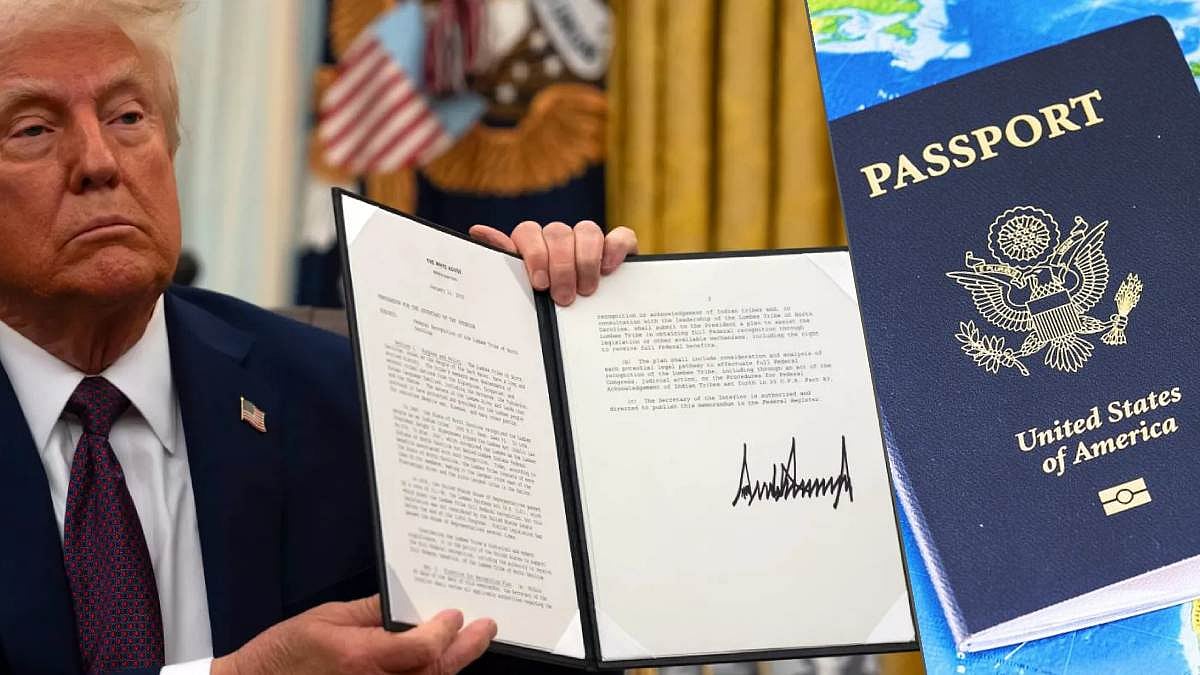H1b Visa: Sanctions? Black Diwali? Or Has President Trump Hurt America?
Disruption and chaos emerge after Trump's order spooking techies. But can these be compared to a sanctions? Who gets hurt the most with such policies?

Image of US President showing an order | FPJ Web Desk
America's latest immigration policy has rightly shook netizens what with the H1B visas turning expensive by 465 times. From "Black Diwali", to "Sanctions" to "Indian IT dreams snapped", commentators have expressed their concerns.
Referring to the policy, India's ministry of external affairs warned of "humanitarian consequences." Amid concerns, the outlook on India's famed IT services sector has taken a beating.
HOW H1B VISAS AFFECT INDIAN TECH SECTOR?
The relevant question is not whether it affects Indian IT sector, but "how much" does it affect. Unfortunately, the answer is unclear.
For a quick estimate though, North America contributed 48.2 percent of TCS' revenue (March 2025 annual report) and for Infosys it was 57.9 percent as of FY25. So, half of the revenues of Indian IT leaders were reported from the US.
Since sponsoring H1B visas is likely to get expensive and with an unhelpful wording of Trump's "Gold Card" proclamation, one may assume that Indian Technology firms would find it expensive to deliver business in America.
That, if their business relied only on H1B visas and not through remote-services. On the other side of the coin, there is also a likelihood that the visa policy may not affect India at all.
WHY VISA POLICY WILL NOT AFFECT?
There's three reasons why Trump's latest salvo may not hit Indian IT businesses:
1. According to Global Trade Research Initiative, an India-based research agency, there are more American enterprises that are likely to be hurt from a visa hike than Indian firms.
2. As per data from US Citizenship and Immigration Services (USCIS) data - TCS had the second-highest H1b beneficiaries at 5,500 applicants as against Amazon's 10,044 workers. The others in the top-ten read names such as Microsoft (5189), Meta(5123), Apple(4202), Google (4181), Deloitte (2353), Infosys (2004), Wipro (1523) and Tech Mahindra (951). While a section believes that businesses of leading American technology firms would be affected, on a cumulative basis, 71 percent of H1b visa holders in FY25 were of Indian origin.
Here's a graph representing the wide share of H1-B approvals based on country of origin (FY23)
3. Indian Companies had already started Deploying Different Business Models: Until some years ago, management discussion analysis (MDAs) of popular IT firms delved on topics such as H1b and visas. However, latest annual reports of TCS, Infosys, Wipro and Tech Mahindra focused on none of that. Reason?
Most of these reports now elaborate on unique models to reduce their risk. TCS, for example, already had identified material work visas as a risk element. And the solution as per their annual report was "through increased hiring of local talent and promoting local talent building in STEM areas to minimize the risk."
WHAT MORE THAN TECH?
Besides the IT industry, and a tepid outlook on Tech-stocks; a list of consequences had been forecast upon sectors such as Pharmaceuticals, Research and Development, Real estate, and remittances. Remittances made from US into India accounted for 10 percent of India's current inflows (estimated at $135.4 billion in in FY25). America had already imposed a one percent tax on remittances in July 2025 and a negative impact could affect currency counters on Monday.
ARE THESE SANCTIONS?
While President Trump himself may not have used that word in reference to H1b visas, media reports and social-discussion interchangeably referred to it.
The last time America imposed sanctions, in 1998, on India over the successful launch of 'Buddha Smiled Again', the sanctions lasted a few months. President Clinton had swiftly initiated a waiver keeping in mind American interests of sourcing food from India.
Explaining the impact, Daniel Morrow and Michael Carriere writing for the James Martin Center for Non Proliferation Studies, wrote in their paper, "For April-June 1998, the net inflow was about $4.2 billion less than in the same quarter in 1997. This amount is modest but not insignificant relative to the whole Indian economy: it is equivalent to about one percent of GDP and four percent of gross domestic investment."
In India's case, the currency reserves back then indicated choppiness between the months of Jan - Sept 1998. While sanctions generally have not yielded desired impact against India, they are likely to affect America's interests.
HOW DOES IT AFFECT AMERICA?
There are three ways such a visa policy affects America.
1. It makes hiring in tech sectors a tad expensive and difficult. Amid a frenzy of hiring AI experts, America is likely to face some hiccups. However the policy also suggests that these visas may be gifted to exceptional candidates.
2. Hiring challenge in specialized sectors such as Pharmaceuticals or R&D is likely to get accentuated.
3. It strains US medical care. In 2023, America spent nearly $5 trillion on healthcare. Costlier H1b visas for doctors and clinicians is likely to cost the average American more.
While Immigration may have enabled US President Donald Trump, it has consistently contributed to making America Great. An American Immigration Council report notes that contributions from H-1B workers in "particular increased employment opportunities available to native-born workers in the United States."
RECENT STORIES
-
-
-
-
-